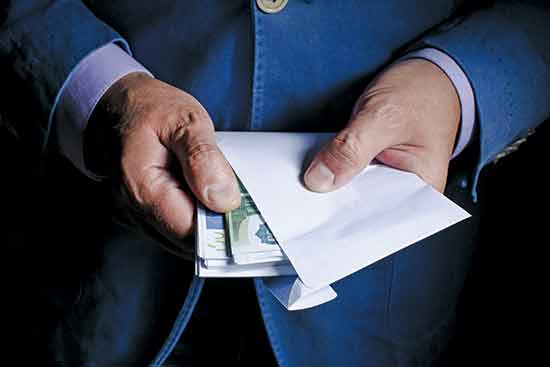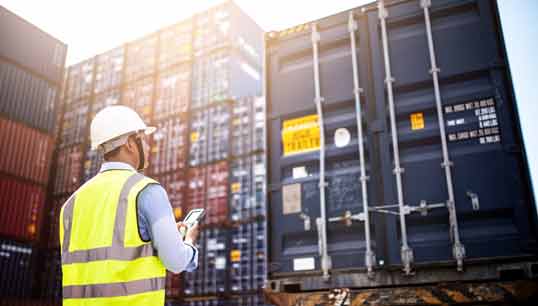- Topics
- Campaigning
- Careers
- Colleges
- Community
- Education and training
- Environment
- Equality
- Federation
- General secretary message
- Government
- Health and safety
- History
- Industrial
- International
- Law
- Members at work
- Nautilus news
- Nautilus partnerships
- Netherlands
- Open days
- Opinion
- Organising
- Podcasts from Nautilus
- Sponsored content
- Switzerland
- Technology
- Ukraine
- United Kingdom
- Welfare
Standing together to say no - how collective action can help stamp out port corruption
17 July 2020

Port corruption in the global shipping industry is a stubborn problem that persists despite individual countries' efforts to pass anti-corruption laws. It's not easy to turn down demands from a local official who is blocking the progress of your ship, but it can be done if we all act as one, writes Vivek Menon of the Maritime Anti-Corruption Network
The nature of the maritime industry brings several unwelcome 'traditional' practices. One of these is the demand for 'compensation' by port authorities, a practice still strong in many parts of the world. In the past this was a request for a small gift, or a need to 'grease the wheels' to get things done; today we call it petty corruption. The acceptance that this practice is now illegal comes slowly to those accustomed to such payments and, in many cases, this leads to relentless discussions with port officials who often threaten the vessel and its crew with expensive delays if these illegal payments are not made.
As a global industry that interacts regularly with government agencies, the maritime industry is exposed to multiple layers of integrity risk, such as frequent demands for facilitation payments including cash or in-kind benefit for a job that is already paid for, or should be part of the day-to-day operation of a port. Often these demands are made indirectly to the Master in private. This corruption gives rise to operational disruption and increased operational costs.
A captain's log – 2002
This is a narrative of an incident during a port call when I was a junior officer.
About an hour after berthing, port health officials boarded the vessel to issue 'free pratique' (licence to enter a port). Two officials attended. They checked through the vessel's sanitation documents and the crew vaccination cards.
They then continued to inspect the galley and bond stores. Whilst inspecting, various minor discrepancies and breaches were pointed out, all of which were questionable and led to discussions.
The duration and degree of these discussions led to a growing feeling of harassment. The approach varied between the two officials, but it was mostly mild in nature. They then threatened fines to the vessel and requested the master sign papers admitting responsibility, which he very kindly refused to do. After hours, literally hours, of negotiation, we eventually got free pratique.
Shortly after, the vessel was boarded by customs, immigration, the local drug and law enforcement agency, and related boarding agent representatives. The officials from these agencies were aggressive and intimidating, with each group checking through the arrival documents and inspections of various spaces onboard.
The inspections were extremely thorough. After about three hours, the officials returned to the master's office threatening fines and producing forms for the master to sign admitting responsibility. Heavy arguments followed, pushing the master into the position where we felt compelled to make unethical payments to resolve the spiralling situation.
At no given point during the discussions were the officials careless enough to overtly ask for any gift or bribe, but it was implied such payments were required to mitigate this situation. The boarding agents became stressed in this situation and were consistently unhelpful. At the same time, cargo operations were suspended, awaiting the conclusion of the official 'inspections'. As a seafarer, you are quite aware of the fact that every moment vessels spend in port costs the owners and operators. Time is money.

In this scenario the true nature of the maritime industry reveals itself, when vessels arrive in ports, harbours, or terminals. They didn't teach us about this part of the business at maritime school! The outside world believes the primary mission of seafarers is to ensure vessels sail safely without interruption, and that ships spend the shortest amount of time in port. Few would think our job is also to pay corrupt officials to ensure they can maintain the lifestyle to which they have become accustomed.
The above example is a classic situation that seafarers face. A state of duress, where on the one hand they are vulnerable to public officials who have the power to fine, detain, and cause delays, which affect the reputation of a vessel and company. In some cases, rejecting demands endangers the safety of seafarers, the vessel, and its cargo.
On the other hand, if masters and seafarers reject these demands, they are vulnerable to reprimand from their companies and to the possibility of criminalisation and imprisonment at the hands of port officials. Because seafarers are never trained nor educated to handle corrupt public officials, managing such situations is only learned through 'doing', thereby potentially facing compounded challenges in various ports as this becomes an accepted practice.
Resilience-building in the maritime industry
The focus on corruption has increased in the international community. The extraterritorial reach of regulations such as the US Foreign Corrupt Practices Act and the UK Bribery Act increases the exposure of anyone engaged in corrupt practices; so if a company engages in corrupt behaviour, this may lead to significant investigations, potential prosecution, high fines, and liability both for seafarer and senior management ashore. Companies now need to change the way they operate and be ready to both internally address these demands, and externally prepare their seafarers to refuse demands.
As a seafarer and among peers, I have heard many times that such illegal demands and behaviours are eternal: 'This is how the industry has always been' and 'What can one do alone to make any change?'
But change is happening in the industry, where some shipping companies have taken a stand against such practices and have achieved successful results through clear communication and collaboration between the vessels and the stakeholders who interact with them. By making it very clear that they support their masters and crew in avoiding any payments, these shipping companies ensure the safety of the seafarers they employ and preserve the integrity of the company.
Additionally, shipping companies have come together to form a maritime industry-led initiative called the Maritime Anti-Corruption Network (MACN) to address corruption challenges faced by seafarers and industry at large in a more systematic manner. Why? Because we believe tackling corruption leads to a better and safer work environment, reduces operational costs, and avoids delays. Seafarers play a key role and can take an integral part in this initiative through some examples below.
Capability building
Given the diversity of the maritime industry and the nature of its operations, companies and seafarers may not know how to best refuse corrupt demands. For seafarers to be able to say no to corruption, they must feel supported by strong company policies and procedures.
These must be dynamic living documents, and the best way to constantly strengthen them is by creating a forum to share challenges and good practice, and collectively assess areas of improvement in internal processes and approaches. Additionally, supporting seafarers with shared methodologies, tools, training and awareness campaigns strengthens their knowledge of how to tackle corruption.
At MACN we have done just this for our member companies, where seafarers can make use of these tools. Any seafarer can also report anonymously to MACN at www.maritime-acn.org/macn-upload, when faced with corrupt demands in ports, harbours or terminals.
But one problem is not the same for all, and one solution does not fit all. This is evident when one listens to seafarers' reports from port calls in various countries. Despite having company anti-corruption policies and procedures, corruption risks will continue to exist in the operating environment if the root causes are unaddressed. So how do we address this, and what role do seafarers play?
Collective action
Collective action is a combined effort – various stakeholders working together to reduce and eliminate the risk of corruption in a specific port or country. Seafarers are an integral part of collective action for several very important reasons. First, we need data and anonymous reports on what corrupt demands are made, by whom and what are the consequences for rejecting them.
Collecting this data means we can clearly demonstrate there is a problem that needs addressing. It allows us to work closely with our peers and partners, including governments, port authorities, and NGOs, to undertake root cause analyses and implement measures to tackle corruption. The simple action of reporting a corrupt incident gives us, the industry, the power to act together to fight illegal demands.

Secondly, collective action is supporting seafarers to say no to corruption in ports. This support takes on many forms. It can be sharing other vessels' experiences and issues, it can be through location-specific training and anti-corruption posters for vessels. It is useful to make use of local points of contact who are independent of the authorities, and who have been appointed to respond to incidents.
Thirdly, collective action means you are not alone. The MACN member vessel calling at the port before you said no, as will the one calling after. This consistency works, and we have numerous reports that when the master says, 'Sorry, MACN member – we can't give you anything', officials know there is no point pushing the demand.
Collaboration
The world relies on its seafarers to provide a safe, secure, and efficient international shipping industry. In order to achieve its vision, to create a level playing-field for the shipping industry, and to avoid compromising on safety, security, environmental performance and a maritime industry free of corruption, it is important to reach out to actors across the maritime industry and encourage sector-wide alignment on anti-corruption thinking.
The voice of seafarers has reached the International Maritime Organization (IMO). The IMO addressed maritime corruption by including this important issue in its work programme for the Facilitation Committee, a decision that came at a meeting of the committee last year (FAL 43 held 8-12 April 2019) in response to a submission from some member states and co-sponsored by the International Chamber of Shipping (ICS), and other non-governmental organisations (NGOs).
By working in partnership with the industry, governments, and civil society, successful solutions are being developed to mitigate corruption risks through country-specific actions in various parts of the world. There are several ways we can address and fight these challenges, and the Maritime Anti-Corruption Network is one such example of an industry-led initiative which has become preeminent to taking tangible steps in building resilience in the maritime industry, thereby building integrity across the wider supply chain.
- A version of this article first appeared in a briefing document issued by the Nautilus partner organisation ISWAN (International Seafarers' Welfare and Assistance Network.)
- For more on the Maritime Anti-Corruption Network, visit www.maritime-acn.org
- Find out more about the Nautilus International Fair Treatment campaign to ensure fair treatment in the event of an incident at sea and an end to the worldwide criminalisation of seafarers

Nautilus Fair Treatment App
Nautilus has launched a Fair Treatment App for members to record incidents at sea. Available in either iTunes or Android Playstore.
Sign in for the Nautilus AppTags
More articles
Training for tomorrow's world – what's new with the SkillSea project
Fast action by ferry crew stopped submarine smash
Real life: Stuck onboard during a global pandemic
UK port operators launch open data project to boost jobs in coastal communities
The UK Major Ports Group (UKMPG) has launched an 'open data' project to boost jobs in coastal communities.
